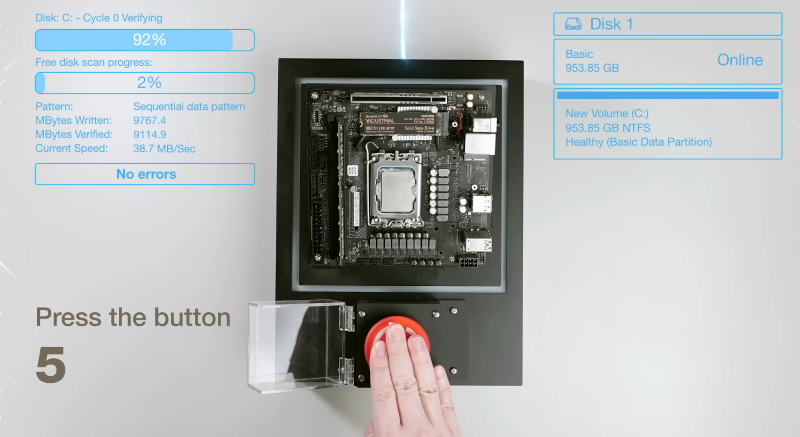In case you can’t wait for your flash memory to die from write cycling, TeamGroup now has a drive that, via software or hardware, can destroy its own flash chips with a surge of voltage. If you wonder why you might want this, there are military applications where how you destroy a piece of equipment is right up there in the manual with how to use it.
They have obviously put a lot of thought into it, as you can see in the video below. Apparently, if you are in the middle of blowing up the flash and power cuts out, the chip will resume frying itself when you restore power.
According to reports, the chip takes about ten seconds and, Mission Impossible style, it emits smoke as it takes itself out.
So, the obvious question for you is: what would you build with such a thing? A place to store your passwords? Or your cooked accounting? The security revolves around you telling it to destroy itself. That’s fine if you have time.
But we wonder how useful this would be against a motivated adversary. After all, you could unplug it and plug it into something else that doesn’t know how to send the “fry yourself” command. Then don’t push the button. It seems like it would be better to require a challenge/response with a cryptography key and, without it, you fry yourself after a certain number of failures. Or are we just paranoid?
Not the first time this has come up, by the way. Maybe these will be the new way to distribute protected media.
















You’re too good for a $50 microwave?!
Microwave doesn’t run on batteries, laptop do run on batteries and can destroy SSD internally if you’re about to get caught
Makita begs to differ…
It needs more smoke!
Thermite is more fun to watch and works with existing media.
This is the kind of protection you use for white collar crime to provide plausible deniability which is something encryption does not provide. Combine it with a GPS module that activates the self-destruct outside of geofence and reboots to a secondary (and non-incriminating) drive to avoid getting caught. It’s easy to claim that the dead drive was merely for media storage but failed a while ago and you didn’t bother to remove it, which is entirely plausible.
Too risky.
* Positioning networks can be degraded or disabled in times of war or civil unrest
* There is a non-zero chance of a sunflare of strong enough intensity causing reception problems
* Someone could run a jammer on the correct frequency
* Noisy harmonic from some cheap preppers transmitter
* GPS is flakey inside at the best times
* Maybe a new building next door might obscure you enough in it’s shadow
And it’s a drive you can’t backup in that case.
It’s also possible forensics would simply look at the brand and model and go “‘ang on there guvnor, this is one of them self-destructing drives innit”
Agree with everything but the last sentence. So what? Plausible deniability, especially in case of a removable drive.
“The device was seized during a raid and I didn’t have the time to disable the security features on it”.
Um, no, it’s not, because that’s not how real drives fail. And I’d want to see some micrographs to prove that their method actually made those chips unreadable to somebody who really knows how to probe them.
As for the deniability of encryption, since you’re building the drive, you can ship it full of random numbers, and arrange that nothing in the flash is ever distinguishable from random without a key that’s not itself stored anywhere on the flash. The right special hardware for this particular issue is a small, reliably and unobtrusively erasable, key storage device. “Frying” things is invariably silly theatrics.
Good points. This seems more useful for planned obsolescence if anything.
I like how they’ve rebranded basic feature of all flash chips ever. The exact feature that gave flash chips its name in the first place. Being able to delete data in single flash of energy. And yes, flash technology has been developed for military for this very reason.
Next thing you know hardrives gonna start randomly frying themselves
Hope you don’t got a virus….🤷♂️
With emphasis on “it’s own flash chips”. Triggers a memory of the moron who destroyed 20+ school PC’s with an USB zapper, and put the video of it on youtube. It did not end well for him. He had to pay for (at least a part of) the damage, and was kicked out of school about a week before his final exams.
It s a stupi idea… This thing you say good is in reality a big fault. All electronic storages, at fotiori online can be hacked, and it will be a nice open window for hacking and destroying datas…. Enabling this option of self destruct chips will cause full loosing datas….
This would be a special piece of hardware for people with something of intense strategic value (or just really illegal) on their computer. I don’t think cloud server banks are going to stock up on them
If you’re caught red-handed by the cops/FBI/FSB an ssd is the last of your problems.